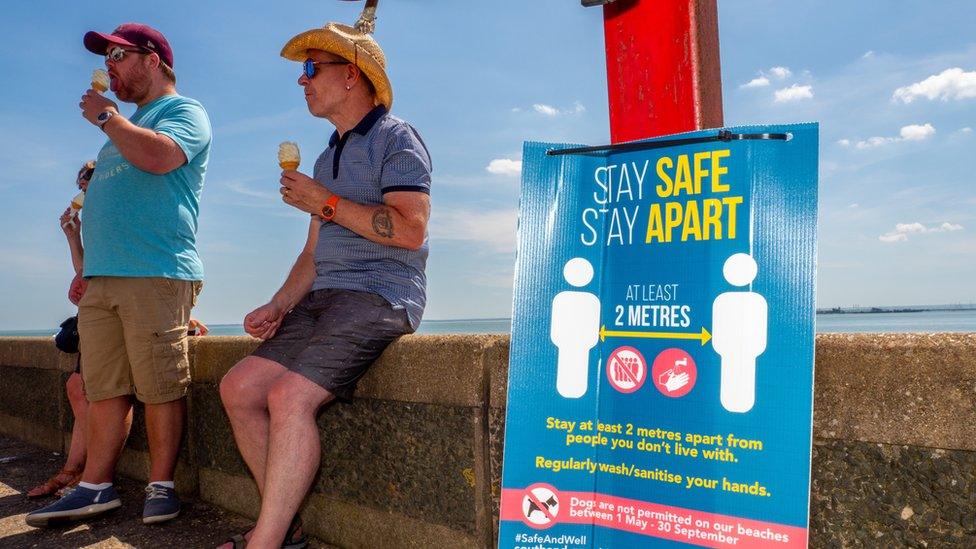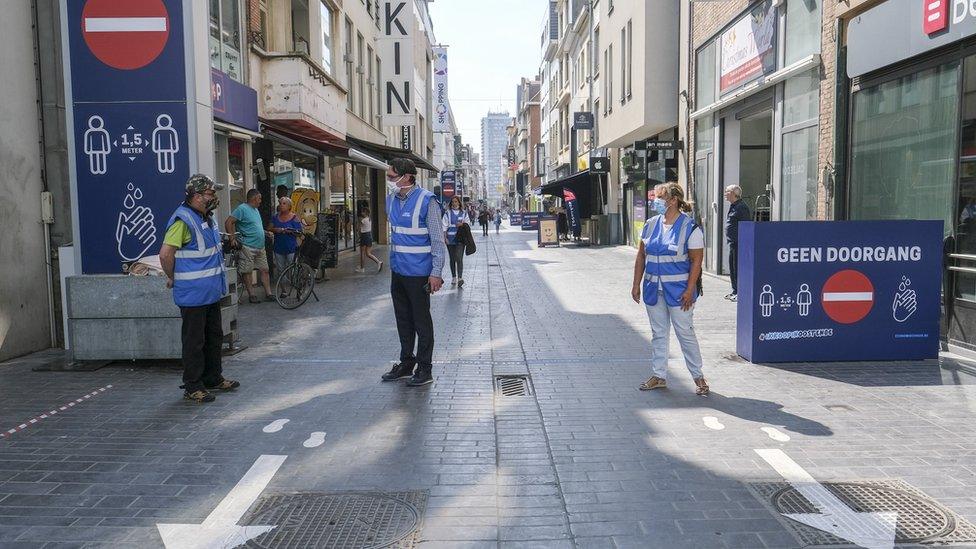Coronavirus: Alarm as crowds flock to European beaches
- Published

European countries have reported 1.74 million confirmed cases of Covid-19
A surge in visitors to beaches in northern Europe after coronavirus lockdowns were eased and temperatures rose has alarmed officials and experts.
Three towns in north-western France shut their beaches on Wednesday because of the "unacceptable" failure of people to observe social-distancing rules.
Municipalities in the Netherlands urged German tourists not to visit.
And in England, the town council in Southend said it might take action after sunseekers flocked there.
The number of confirmed cases of Covid-19 around the world has now passed five million, but the number of new infections has been falling across most of Europe.
European countries had reported 1.74 million cases and 164,349 deaths as of Wednesday, according to the European Centre for Disease Prevention and Control. Those with the most fatalities are the UK, Italy, France, Spain and Belgium.
The World Health Organization (WHO) has warned that there is "still a long way to go in this pandemic", and called on people in countries where restrictions are being eased to continue to adapt their behaviour to minimise transmission of Covid-19.
The authorities in France reopened hundreds of beaches last weekend for running, swimming and fishing, but not for sunbathing or picnicking.
On Wednesday evening, the prefecture of Morbihan, in Brittany, said beaches in five municipalities had been closed because of "unacceptable behaviour", external by visitors in recent days, including incivility and ignoring social distancing.
Several municipalities in the Netherlands meanwhile called on German tourists not to cross the border for a trip during the Ascension Day public holiday on Thursday.

Stewards enforced a one-way system for pedestrians in the Belgian coastal town of Ostend
The Zeeland Safety Region temporarily closed roads in seaside town of Vlissingen to vehicles, external, while the Limburg-Noord Safety Region warned that it would seek to prevent crowding in its town centres and shopping malls, external by fining people who violated social distancing and other rules.
People also headed to beaches across England on Wednesday on the hottest day of the year so far, a week after lockdown rules were eased. But people in England should not travel to Wales, Scotland or Northern Ireland, where the public is still being told to avoid any travel which is not essential.
A care worker's tweets expressing concern at the pictures from Southend-on-Sea, in Essex, were shared 20,000 times.
Allow X content?
This article contains content provided by X. We ask for your permission before anything is loaded, as they may be using cookies and other technologies. You may want to read X’s cookie policy, external and privacy policy, external before accepting. To view this content choose ‘accept and continue’.

Southend town council appealed to beachgoers to keep their distance, and warned that it might have to close the seafront to traffic as a last resort if it considered the crowding to be dangerous, external.
On Wednesday, European Union tourism ministers agreed to do "whatever it takes for the quick and full recovery of European tourism".
They broadly backed plans spelt out by the European Commission that the bloc's internal borders should come down in phases, based on the prevalence of Covid-19 in countries of origin and destination.

Have you felt safe going to the beach? Share your experiences by emailing haveyoursay@bbc.co.uk, external.
Please include a contact number if you are willing to speak to a BBC journalist.
WhatsApp: +44 7756 165803
Tweet: @BBC_HaveYourSay, external
Send pictures/video to yourpics@bbc.co.uk, external
Please read our terms & conditions and privacy policy